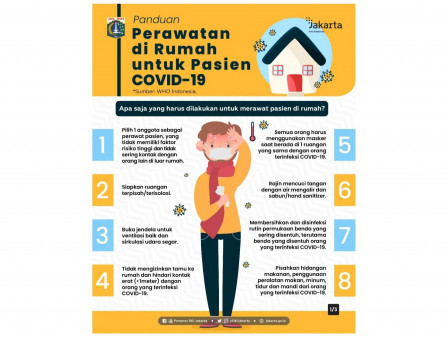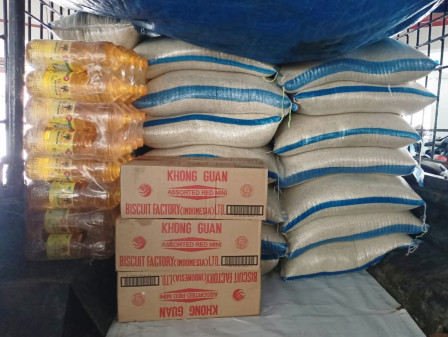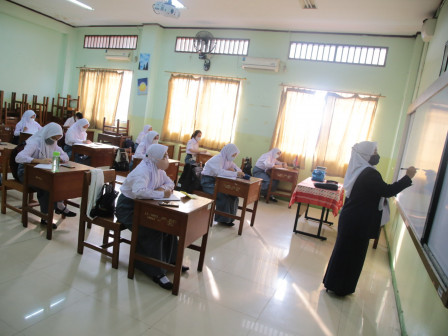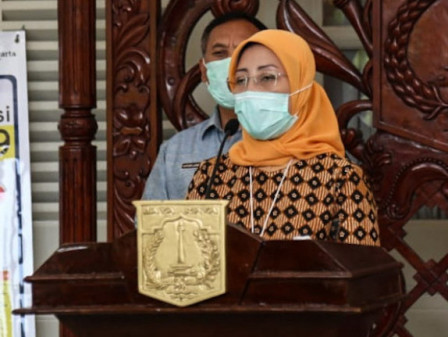Knowing Terms and Procedures of Self-Isolation for Covid-19 Patients
Reported by Aldi Geri Lumban Tobing | Translated by Nugroho Adibrata
The Jakarta administration continues to call on Jakarta residents to stay alert, but don't panic amid the Omicron coronavirus variant case spike in the capital.
The clinical requirements include the patient must be less than 45 years old
That is why, it is important for them to know information related to symptoms, prevention, procedures for self-isolation, high-risk factors, and other things related to Covid-19, in addition to the government's ongoing anticipatory efforts.
Jakarta Health Agency (Dinkes) Head, Widyastuti explained that Covid-19 patients with no symptoms and mild symptoms can self-isolate if they meet clinical and home requirements. It is in accordance with the Health Minister Decree number HK.02.01/MENKES/18/2022.
COVID-19 Vaccination Rate Reaches 136.98 Percent in North Jakarta"The clinical requirements include the patient must be less than 45 years old, have no comorbidities, can access telemedicine/other health services, commit to remain isolated before being allowed to leave," she expressed, as quoted by Jakarta PPID's press release, Wednesday (2/2).
While the requirement for the house and other supporting equipment is the patient must be able to live in a separate room (better if the floor is separate), there is a bathroom in the house that is separate from other residents.
If it does not meet the clinical and home requirements, the patient must be isolated in a centralized isolation facility and under the supervision of the local Health Center or Task Force.
Centralized isolation is conducted in public facilities prepared by the central government, local government, or the private sector coordinated by the Health Center and the Dinkes.
The following are guidelines for families and caregivers of patients at home:
- Assign a family member whose role is to treat or monitor the patient's condition
- Do not have high-risk factors and have frequent contact with other people outside the home
- Prepare separate rooms or isolated rooms for Covid-19 patients
- Open windows to promote good ventilation and fresh air circulation
- Do not welcome guests into the house and avoid close contact (less than 1 meter) with Covid-19 patients
- Wear a mask when you are in the same room
- Diligently wash your hands with clean running water and soap, or use an alcohol-based hand rub
- Clean and disinfect regularly the surfaces of objects that are frequently touched, such as tables, doorknobs, banisters, and so on
- Food dishes must be separated, and use separate toiletry from the infected person
- Covid-19 patients should rest, drink plenty of water and eat nutritious food and continue treatment for chronic diseases
- Take fever-reducing medication (paracetamol/acetaminophen) if you have a fever and/or reduce body aches/aches according to the instructions. Antibiotics are not effective for Covid-19
Covid-19 patients who are self-isolating are declared complete isolation/recovered with the following criteria:
- Covid-19 patients who are asymptomatic (asymptomatic) must be isolated for at least 10 days from the time of taking the confirmatory diagnosis specimen
- Covid-19 patients who are symptomatic must isolate for 10 days from the onset of symptoms plus at least 3 days free of symptoms of fever and respiratory problems
- Covid-19 patients who have experienced clinical improvement while undergoing independent isolation or controlled isolation can undergo NAAT examination (including RT-PCR examination) on the 5th and 6th day with an interval of 24 hours
*If the result is negative or the CT is more than 35 for 2 consecutive times, it can be declared that the isolation has been completed/cured. Funding for this inspection is done independently
- Covid-19 patients who have experienced clinical improvement during self-isolation/controlled isolation but no NAAT examination including RT-PCR examination on the 5th and 6th day with an interval of 24 hours, the patient continues to isolate for at least 10 days from the onset of symptoms plus at least 3 days free of symptoms of fever and respiratory problems
Further, monitoring of symptoms of Covid-19 patients must be done regularly, and immediately contact health workers if there are dangerous symptoms.
These dangerous symptoms include shortness of breath or difficulty breathing, chest pain, confusion/loss of consciousness, unable to speak/move.
While for people who are at risk of experiencing severe and fatal symptoms if they suffer from Covid-19 are people aged 60 or older, having a history of hypertension (high blood pressure), diabetes mellitus (diabetes), heart disease, chronic lung disease, kidney failure. chronic diseases, immune disorders (including HIV), obesity/overweight, cancer, and pregnancy. Covid-19 patients with these risk factors should be closely monitored by health workers.





